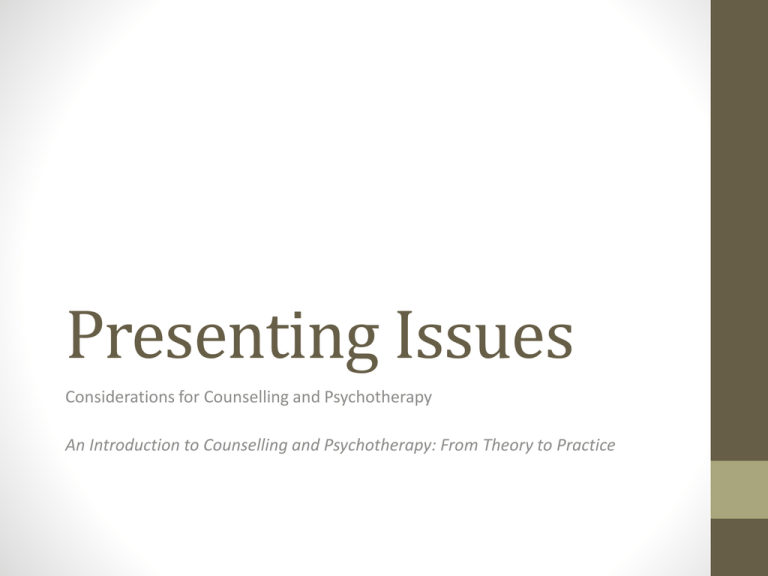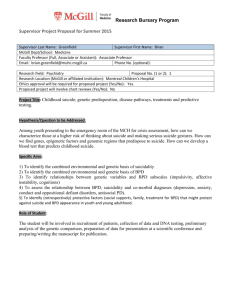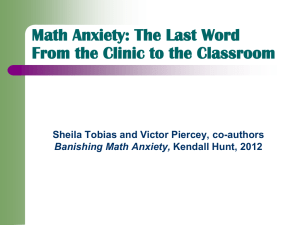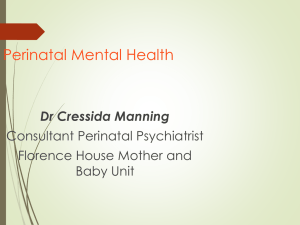
Presenting Issues
Considerations for Counselling and Psychotherapy
An Introduction to Counselling and Psychotherapy: From Theory to Practice
Anxiety and Panic Attacks
• Support can including specific techniques to help manage anxiety
and panic, but also space to explore underlying issues
• Strategies can include:
• Relaxation techniques (e.g., relaxation CD, or meditation)
• Guided imagery (e.g., talking the client through an imagined place
they associate with calmness)
• Use of self-help books and online resources
• Breathing exercises (e.g., encouraging calm, steady breathing)
• Physical exercise
• Avoiding stimulants (e.g., caffeine, alcohol)
• Ensuring good sleep routines
• Positive ‘self-talk’ (e.g., I am going to be okay)
• Meditation techniques, such as mindfulness
• Medication (if agreed between client and GP as a short-term
strategy).
Depression
• Important the client understands the nature of therapy being
offered and how it might help
• Undertaking a careful assessment
• Where depression is suspected but not yet diagnosed, exploring
with the client possible benefit of a GP referral
• Taking an holistic approach: social and physical factors are as
important as psychological ones in a move to health
• Timing sessions when the client is best able to make use of them
(e.g., early morning sessions might not work)
• Understanding the impact on the client of any existing prescribed
medication
• Ensuring regular reviews
• Helping the client to understand the nature of their fluctuating
mood (to help build resilience to ‘down’ times)
• Paying careful attention to the risk of suicide or self-harm.
Post-Traumatic Stress Disorder (PTSD)
• Specific approaches have been identified as particularly useful
for PTSD:
•
•
•
•
•
•
•
CBT
Exposure therapy
Cognitive therapy
Anxiety management (see previous slide)
Eye movement desensitisation and reprocessing (EMDR)
Hypnotherapy
Medication
• Always work within own competence and make careful use of
supervision
• Ensure the client has sufficient support in place (e.g., selfsupport and social support), prior to beginning therapy.
Eating Disorders
• Assessment might include:
•
•
•
•
•
•
Current and past physical health treatment
Cognitive abilities
Any present physical disabilities
Family and interpersonal relationships
Social circumstances and support
Occupational and social functioning
• Therapy should also consider:
•
•
•
•
Client’s understanding of therapy and willingness to engage
Agreement to liaison with other professionals, where appropriate
A recent health check by GP
Clearly defined agreements of confidentiality should physical or
mental health deteriorate
• An agreement about the focus of therapy (which might not
necessarily always include food).
Loss and Bereavement
• Important to acknowledge how hard it is for people to talk
about dying and death
• Importance of listening and providing a forum for the client to
talk
• Important to ‘normalise’ the grief process (e.g., not
pathological), and to help the client locate their own
experience within that context
• Where appropriate, gently challenge any internalised ‘scripts’
(e.g., I should be over it by now)
• Psycho-educational intervention can be helpful (providing
information)
• Keep in mind the potential for other mental health distress
• Be aware of current research and thinking (e.g., continuing
bonds).
Suicide and Self-Injury (SI)
• Be aware of personally held views about suicide/SI and how they
can influence your approach
• Working with risk can provoke anxiety in practitioners. Anxiety is
not a ‘bad’ thing if self-support is in place, but is problematic when it
prevents us from engaging with our clients
• Be aware of context of working situation and any policies or
procedures in place for working with clients at risk
• Be aware of the contract of confidentiality and how limitations to
confidentiality would be managed in practice
• Be aware of local agencies and mental health support options in the
event of crisis – know of these before you need to
• Understand relevant social policy and be aware of research
• Know the legal and ethical parameters in which you work
• Reflect on how risk is recorded in case notes
• Always be prepared to ask the ‘suicide question’.
Sexual Problems
• Consider referring to a specialist service, if appropriate
• Always remember there may be a physiological cause for
problems and a GP referral is advised prior to therapy
• Be comfortable in talking about sex and sexual problems
• Ensure there is careful discussion in supervision about any
work to be undertaken
• Asking about sex in assessment can help flag problems early
• Make use of self-help and online resources for the client to
work on between sessions
• Help explore the link between the client’s perceptions of their
sexual self and their sexual relationships (including their
relationship with themselves).
Psychosis
•
•
•
•
Psychosis requires careful and specialist assessment
If in doubt, agree with the client a referral for such an assessment
Consult carefully with your supervisor
Psychosis can be treated with a number of interventions, including:
•
•
•
•
•
•
•
•
Medication
Education
Family support
Hospitalisation
Rehabilitation programmes
Self-help groups
Nutrition, rest and exercise
Talking therapies
• The provision of talking therapies needs to be in the context of a
well-planned and supported network of care.
Borderline Personality Disorder (BPD)
• Help the client to explore what a diagnosis of BPD means for
them
• During assessment, explore the factors that led to a diagnosis,
when it was made, and by whom
• As with all therapy, offer clearly articulated boundaries,
empathy, respect and honesty
• Work within agreed boundaries and do not allow these to be
undermined
• Make careful use of supervision
• Be clear with the client what they hope for from therapy and
what their goals might be
• Be aware of current research, and also some of the writing
that critically reflects on the nature of BPD as a diagnosis.












